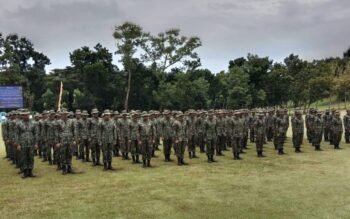MALAYBALAY CITY (MindaNews/27 September) – Former president Gloria Macapagal-Arroyo erred in issuing Presidential Proclamation 310 which granted 670 hectares of land taken from a state university in Bukidnon as part of the ancestral domain being claimed by a Manobo-Talaandig tribe, the Supreme Court said in an en banc decision posted on Friday in its website.
In a decision penned by Justice Roberto A. Abad and dated Sept. 21, the SC ruled that PP 310, which awarded a portion of Central Mindanao University’s 3,410 hectares to the tribe, is unconstitutional since the university’s lands were not inalienable public lands.
Arroyo issued the proclamation on January 7, 2003 upon the recommendation of Task Force 63, a body formed to fast-track executive action on ancestral domain claims in areas where violence was likely to erupt between the contending parties.
 The Court held that when President Carlos P. Garcia dedicated the lands for CMU’s use in scientific and technological research in the field of agriculture in 1958, the announcement said, the lands have since become inalienable.
The Court held that when President Carlos P. Garcia dedicated the lands for CMU’s use in scientific and technological research in the field of agriculture in 1958, the announcement said, the lands have since become inalienable.
Garcia issued PP 476 in 1958 delineating CMU’s property in Musuan, Maramag, Bukidnon.
The late CMU president Mardonio Lao questioned Arroyo’s proclamation before the Regional Trial Court and later at the Court of Appeals.
CMU pursued the case up to the Supreme Court even after Lao’s death, in August 2008, due to complications caused by a liver disease.
Lao vowed not to allow the claimants to come in pending court decision on CMU’s petition.
He said the petition did not intend to defy Arroyo but to exhaust legal means in protecting the university’s titled property.
The SC used the decision in CMU v. Department of Agrarian Reform Adjudication Board (DARAB), where CMU questioned DARAB’s order segregating 400 hectares of CMU lands for distribution to farmer-beneficiaries.
In that decision the High Tribunal nullified DARAB’s order, saying CMU’s lands were inalienable being part of the “long-term functions of an autonomous agricultural educational institution.”
Transferring the ownership of the lands in question, the Court added, is not in accord with the Indigenous People’s Rights Act of 1997. It argued that IPRA provides that “property rights within the ancestral domains already existing and/or vested upon its effectivity shall be recognized and respected.”
CMU challenged the constitutionality of PP 310 before the Regional Trial Court in April 2003. The trial court dismissed the petition on the ground that jurisdiction lies with the Manila RTC where the official act of the Executive Department was done.
In the same ruling, however, the trial court upheld the constitutionality of PP 310, saying the owner of the lands in dispute is the State and that CMU merely held them in the State’s behalf.
The CA in Cagayan de Oro dismissed CMU’s appeal for lack of jurisdiction. It said the issues raised were pure questions of law and thus should have been filed directly before the SC via certiorari, according to the website announcement.
The SC, while ruling that the constitutionality of PP 310 was indeed a question of law and thus jurisdiction properly lies with it, noted that the issue of whether the RTC prematurely decided on the constitutionality of PP 310 when the issue had not been properly raised and heard was a factual issue that was proper for CA Mindanao to hear and decide.
Instead of remanding the case to the CA, however, the High Court decided to resolve the case as the constitutionality issue will ultimately be referred to it and to avoid delay and multiplicity of suits.
In May 2008, CMU blocked a government composite team from conducting a land survey, defying the presidential order delineating a fifth of its area for indigenous peoples.
CMU, formerly the Mindanao Agricultural College, was created under Presidential Proclamation No. 476 on January 16, 1958. (Walter I. Balane/MindaNews)
